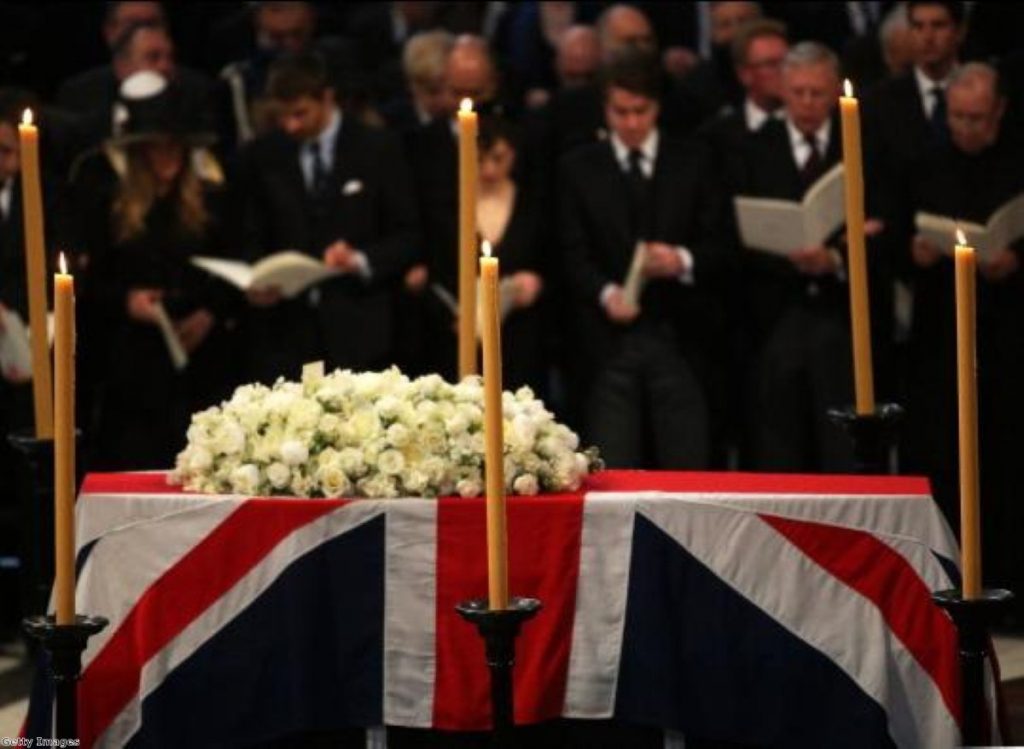The week in review: Dazed and bereaved
Backbench MPs are usually fairly self-important sorts of people with a strong sense of dignity and self-esteem. So you know you're in an unusual environment when you spot one of them with their mouth open, gaping vaguely like a befuddled tourist, filming you wandering out of a door with their smart phone.
The door was one of the bigger exits from St Paul's Cathedral, and minutes earlier Margaret Thatcher's coffin had exited on its final journey after a funeral service attended by 2,300 thoroughly important people.
Tory MPs were about as lowly as they came. The service, attended by luminaries as diverse as Henry Kissinger, Joan Collins and this reporter, was about as grand as this sort of occasion gets. It may not have been an official state funeral, but this felt a lot like the establishment giving one of its champions the send-off she deserved.
http://pukdevelop.wpengine.com/comment-analysis/2013/04/17/eyewitness-report-thatcher-s-sterile-funeral


It was the sort of occasion where the attention is on former prime ministers mingling together in the midst of one of the country's finest public buildings – and your ordinary, everyday MP is downgraded to a lowly hanger-on, basking in the reflected glory of the Saviour of Britain.
Thatcher's funeral was the climax of a fortnight of wall-to-wall coverage of the Iron Lady examining her impact over two decades after she left power. The politics of the event itself turned into a big story with a momentum of its own, adding another layer to the debate, and making the occasion all the more potent. It was as if all the other news stories going on at the moment had been temporarily blanketed.
As it happened, there was some very important 'other' news taking place. In Boston, a terrible terrorist atrocity had cast a shadow over the security arrangements for this weekend's London marathon. Michael Gove decided to award all pupils with a permanent after-school detention, forever, by extending the school day. And the prime minister lost another little bit of his authority, as Tory MPs rebelled against the coalition's plans to make it easier for middle-class people to build bigger extensions.
You probably didn't notice all of those stories, though, did you? The little tweaks to society they represent seemed to quail in comparison with the monstrous changes wrought by the Iron Lady, who – whatever you may think of her – seems to stand in a category of her own. Not that anyone told Ed Miliband, who by the end of the week seemed to be suggesting he was planning to lead a spot of Thatcher-scale reworking of the country in the coming years.
That came in Miliband's attempt to move the debate on from Thatcher, which, now she is no more, we will all duly do. So now the political world will emerge from an unexpected fortnight of diligent contemporary history studies to the present day. To a world where a fascinating Conservative-Liberal Democrat clash in shire local elections are now as close as the week after next, and the prospect of a triple-dip recession is looming horribly in next Thursday's GDP update, and the Lords prepares to vote on secondary legislation which basically amounts to the privatisation of the NHS. Thatcher was important, but Thatcher is now in the past. It's time to face the future. It's time to move on.









